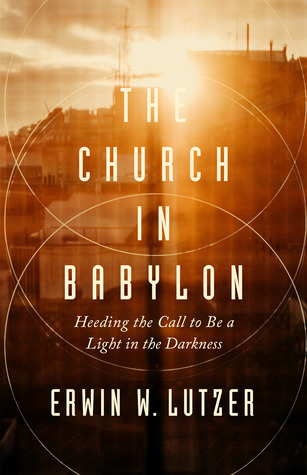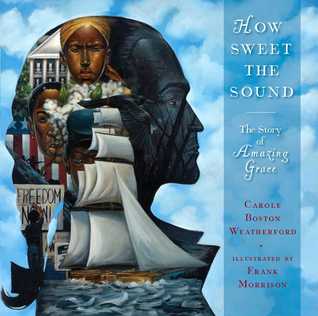The Church in Babylon: Heeding the Call to Be a Light in the Darkness. Erwin W. Lutzer. 2018. Moody Publishers. 208 pages. [Source: Review copy]
First sentence: The church in Babylon! Those four words plunge us into the heart of our present cultural context here in the West.
True or false: The church's values should be different from the world's values.
True or false: When traditional church values clash with contemporary cultural values, the church should change to keep in step with the times.
True or false: The Bible's message changes for each and every generation. Each generation is to keep what is relevant and speaks to them and throw out the rest.
True or false: The Bible has been misunderstood by every single generation except this one.
True or false: There is only one absolute truth, and that one fundamental, not-to-be-questioned truth is this: THERE ARE NO ABSOLUTE TRUTHS.
True or false: The greatest sin one can commit is to offend someone.
Erwin Lutzer is not the first or the last to write a strong message to the modern-day church. The Church in Babylon IS a strong message, no doubt about it. Subtlety was not what Lutzer was aiming at! It is a plea to the church--to the collective church, to individuals, to families--to be discerning: to love what is good, to hate what is evil. It urges believers to know the truth, speak the truth, teach the truth, stand up for the truth. The Word of God is to have authority over us, we are not to be ruled by ever-changing codes, values, morals of society, of culture. We are not to call good 'evil' and evil 'good'.
Chapters include: "Welcome to Babylon," "A Light to the City, a Heart for God," "Conflicts of Conscience," "When the State Becomes God," "The Church, Technology, and Purity," "Transgenderism, Sexuality, and the Church," "Islam, Immigration, and the Church," "Five False Gospels Within the Evangelical Church," "Taking the Cross Into the World," "Jesus at the Church Door," "The Church That Will Survive in Babylon."
The premise of the book in Lutzer's own words:
In brief, the purpose of this book is to answer three questions: First, what does faithfulness look like in a nation that has lost its way, a nation that appears to be under the judgment of God? Second, what are those issues that we, as a church, must confront in order to represent the God we worship? Or to put it differently, what instructions might Christ give us as we prepare ourselves for the darkness that is closing around us and the deeper darkness that’s on its way? Finally, Jesus told five of the seven churches of Revelation to repent. Might that not be His message to us? What might He be asking us to repent of ? Where might we have lost our way?
Is The Church in Babylon offensive? Yes. It is potentially offensive. It embraces the idea--the notion--that the very nature of the gospel IS offensive. The gospel always has been and always will be offensive.
The message is that we are all--one and all, nobody excluded--sinners. We are sinners by nature; we are sinners through and through. There is not one person untainted by sin--sin from the inside. We are dead, blind, lost, enslaved. And the natural man loves it that way. Sin is what pleases the natural man. We freely and gleefully cling to sin--even as it kills us.
The message is that we are incapable, unable, unwilling to change. We need a Savior. We don't even know we need a Savior. Our greatest need is to be reconciled to God.
The message is that we can't save ourselves, that we can't contribute anything to our salvation. We are not saved by good works. We have no merit to contribute to our salvation. WE bring nothing but sin. We come as we are: broken, crushed, hopelessly helpless.
The message is that God is God and we are not. Jesus is LORD and SAVIOR. We are to surrender our wills to HIS WILL. We are to OBEY. We are to SUBMIT. We are to live as if we are not our own, but HIS. We are called to live and love sacrificially. We are called to live holy lives. We are called to be humble, to stay humble.
The message is that we are called to live in the Spirit, by the Spirit, with the Spirit. And the Spirit cannot tolerate sin. We are to hate sin as the Spirit hate sins.
The message is that we should cling to the truth--know it, love it, embrace it, proclaim it--and not worry about the world's approval.
Lutzer writes about modern-day culture, the contemporary church, and the glorious truths of the Word.
Quotes:
A church that has assimilated the world cannot be a vibrant witness to that world. To adopt prevailing cultural values hardly gives the world a reason to believe that we are a viable alternative to lives of brokenness, greed, and addiction.
We have to be a church that is, in some ways, repulsive to the world because of our authentic holiness and yet very attractive to the world because of our love and care.
If we are not distinct from the world, we will have nothing to say to the world.
Salvation is free, but as the seven churches of Revelation discovered, there is a cost to living authentic lives of holiness in a godless culture. We cannot take the resources Christ offers for granted but must diligently seek Him and His Word with prayerful wisdom.
The nature of evil is to plunge ahead, deliberately closing one’s eyes to the consequences.
We are called to be alive and represent Him at this hour of our history. We could have been born in a previous era, a future era, or not born at all. God has a reason for us living now. The God who calls is the God who provides.
Young or old, married, single, or widowed, God has equipped us to live for Him in this hour. As we shall see, we are to live without fear and with joy at the privilege of representing Christ even at great personal cost.
There are risks involved when Christians live in a pagan culture without proper safeguards. The culture can devour us. And yet, I believe that the mandate found in Jesus’ prayer, “I do not ask that you take them out of the world, but that you keep them from the evil one,” (John 17:15) is still applicable today.
We are called to expose the sins of the world, but to do so with redemption, in humility and compassion. And, yes, with courage. And tears.
We, as the church, will never be effective unless we see ourselves as sent by Christ into the world. He prayed, “As you [the Father] sent me into the world, so I have sent them into the world” (John 17:18). We are pilgrims, out of step with the ever-changing culture—yet we are sent by Christ, the Head of the church.
Confidence in God’s unassailable sovereignty fuels worship. Only those who see God even in their defeats can offer Him praise at all times just as the psalmist wrote, “I will bless the LORD at all times; his praise shall continually be in my mouth. My soul makes its boast in the Lord; let the humble hear and be glad. O, magnify the Lord with me, and let us exalt his name together!” (Ps. 34:1–3).
We have to take a stand against the culture, but we must do it in a way that never loses sight of Jesus. We stand against the culture with a redemptive mindset. We have to take account of culture, to be aware of what is going on in our world, and to accept it as far as our conscience allows, but then we have to draw the line and say, “This far but no further.”
God knows the longitude and latitude of our little boat as we cross the tempestuous sea. He knows the strength of every board. He knows the trajectory of the wind and its speed. Let us never say there are so many disturbing trends in our society that we must simply blend in with the culture as best we can. Nor should we withdraw from our culture abandoning it to its well-deserved fate. Let us not divorce God from our predicament, but rather see God in it.
Satan’s one desire is to draw our souls away from God, then he substitutes pleasure, guilt, self-condemnation, and anger in God’s place.The devil wants us to continue to violate what we know to be right and so fills our minds with a list of rationalizations. Satan doesn’t respond to sweet reason, he doesn’t play by the rules, and he won’t go down without a fight. Churches need to help, guide, and encourage their people, and confront the enemy as necessary. There is nowhere to hide. This is not a war that can be won without prayer, earnest prayer, and intercessory prayer. And accountability.
The bottom line is that we must love God more than we love our sin. But this love cannot be manufactured; it cannot be turned on and off like a faucet. The love we have for God must be God-given, the result of conversion. And this love is nurtured through the Word of God and the fellowship of God’s people. It grows in response to what God has done for us.
There’s a story about a man who dreamt he was carrying a heavy cross on his shoulder. He was exhausted; he wished that his cross was lighter. In the dream he saw a woodsman with an axe, so he asked that a good part of his cross be chopped off. After that, the man happily resumed his journey, thankful that his cross was so much lighter. On his journey, he came to a chasm between two mountains. He wanted to continue but found that he couldn’t bridge the gap; if only his cross had been longer, he could have laid it down and used it as a bridge. But the cross was short—by just the length that had been chopped off. When the man awoke, he was glad this was only a dream. He now realized that only those who are willing to carry a heavy cross are able to scale the next mountain. Those who are constantly in search of a lighter cross will never go far in claiming territory for Christ. At some point, they will conclude that the price of obedience is too high. The obstacles too formidable.
© Becky Laney of
Operation Actually Read Bible









